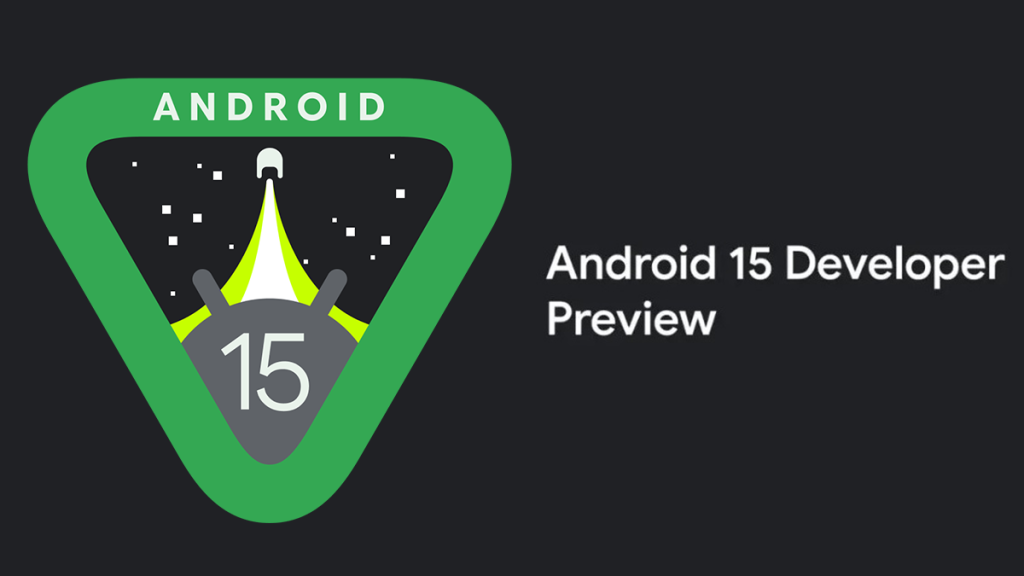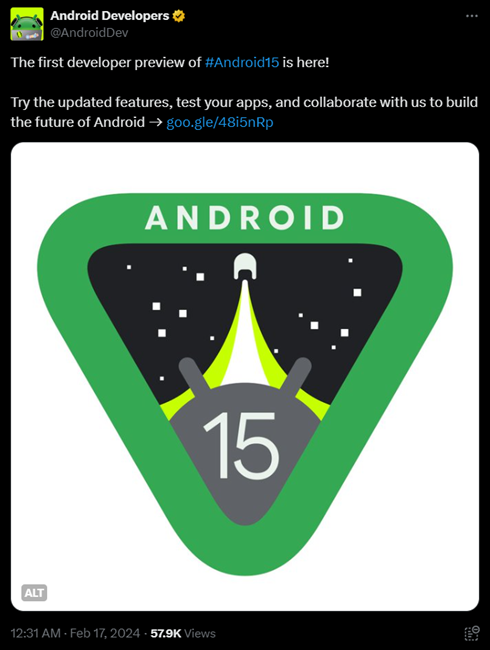
Google has released the first Developer Preview of Android 15, one day later than expected.
With Android 15, Google aims to improve productivity and media experiences, while also focusing on boosting app performance, preserving battery life, and enhancing user privacy and security across various devices.

Privacy and Security Measures
Android 15 introduces features to safeguard user privacy and security:
- Privacy Sandbox: Upgrades Android AD Services to extension level 10, incorporating the latest Privacy Sandbox for personalized advertising experiences while prioritizing user privacy.
- Health Connect: Integrates Android 14 extensions 10, offering a secure platform to manage and share health data collected by apps.
- File Integrity: Introduces FileIntegrityManager with enhanced security features utilizing fs-verity to prevent unauthorized file modifications or malware attacks.
- Partial Screen Sharing: Supports sharing or recording specific app windows for improved user consent and privacy.
Support for Creators
Android 15 provides tools and hardware support for creators, including:
- In-app Camera Controls: Offers more control over camera hardware and algorithms, facilitating low light enhancements and flash adjustments.
- Virtual MIDI 2.0 Devices: Extends support to virtual MIDI apps, enabling composition apps to control synthesizers effectively.
Performance and Quality Enhancements
Android 15 focuses on enhancing app quality and performance:
Dynamic Performance: Expands the Android Dynamic Performance Framework (ADPF) with power-efficiency modes and thermal management capabilities.
Developer Productivity
Android 15 continues to enhance developer productivity by adding OpenJDK APIs and quality-of-life improvements, ensuring compatibility with over a billion devices running Android 12+.
Timeline and Updates
Google outlines a timeline for Android 15’s development, including Developer Previews, Beta releases, and the final release to the Android Open Source Project (AOSP) and ecosystem.

- February: Developer Preview 1 (Early version for developer feedback, with new features, APIs, and behavior changes).
- March: Developer Preview 2 (Update with more features, APIs, and behavior changes).
- April: Beta 1 (First beta-quality release, available via over-the-air update to early adopters in Android Beta).
- May: Beta 2 (Incremental beta-quality release).
- June: Beta 3 (Marks Platform Stability milestone with final APIs and behaviors, and opens Play publishing).
- July, August: Beta 4, … (Near-final builds for final testing).
- Final release: Android 15 released to AOSP and ecosystem.
Platform Stability Milestone
Android 15 includes a Platform Stability milestone, expected to be reached at Beta 3 in June 2024, signaling the finalization of APIs and behaviors.
Google encourages developers to target this milestone for final compatibility testing and release planning.
Getting Started with Android 15 – Developer Preview 1
The First Developer Preview of Android 15 is currently available for the following Pixel devices, exclusively catering to developers for testing purposes and not intended for daily consumer use:
- Pixel 8 and 8 Pro
- Pixel 7, 7 Pro and 7a
- Pixel 6, 6 Pro and 6a
- Pixel Fold
- Pixel Tablet
Google encourages developers to engage with the Developer Preview to provide feedback and prepare for the upcoming Android 15 release.
Speaking on the announcement, Dave Burke, VP of Engineering, said,
We’re excited to announce the release of the first Developer Preview of Android 15 today, inviting our developers to collaborate with us in crafting a superior Android experience.
Android 15 advances our mission to create a platform that enhances productivity, fosters superior media experiences, optimizes battery efficiency, boosts app performance, and prioritizes user privacy and security across a diverse range of devices.
Additionally, Android remains dedicated to equipping developers with the necessary tools and libraries to leverage the latest advancements in AI.
